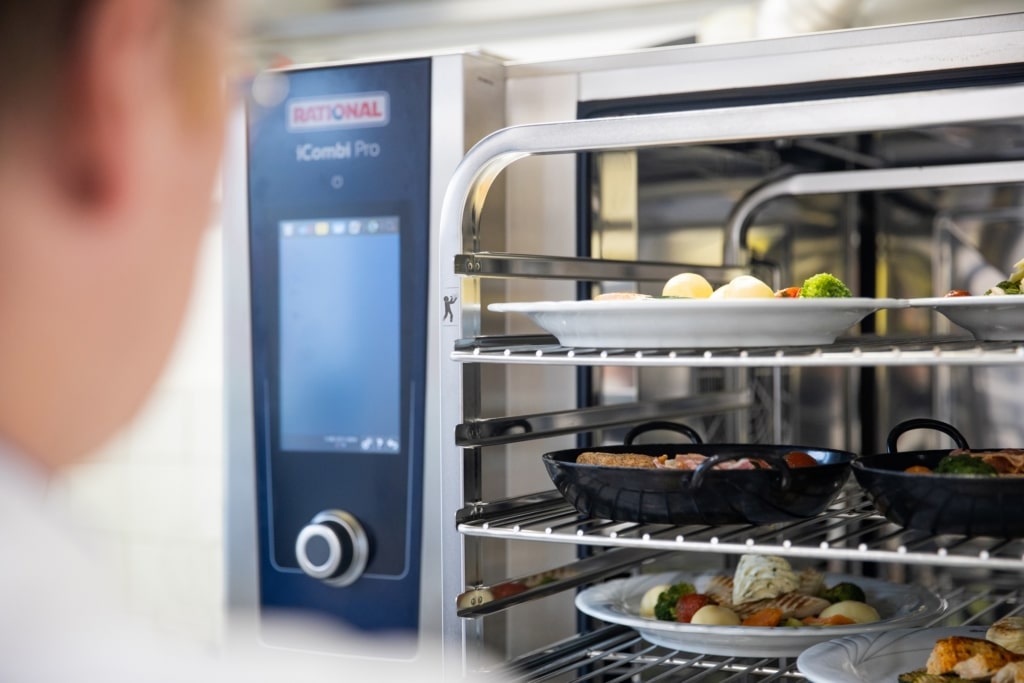
When the lunch-break siren used to go off at twelve o’clock, everyone stormed to the canteen at the same time and the game “on your marks, get set, go” began for the kitchen, which had the same time pressure as a 1,000-meter run, say the experts at Rational.
Today, there is no lunch-break siren and nobody knows High Noon anymore, because with the modern flexibility offered in the workplace, provided meal times have been adjusted as well.
For the kitchen crew, this means that a 1,000-meter run has become an obstacle course. Longer meal times, to-go concepts and snacks between meals now determine the daily routine. And on every metre, the guests want to have a large selection, freshly prepared, always of the same quality. Such a concept presents challenges for the kitchen crew and kitchen equipment.
Experts have been seeing the change towards flexible meal times and the challenges that come with it for some time, as Thomas Hofer, Managing Director RATIONAL Kitchen & Catering Equipment Trading FZCO, notes: “Even before Corona, we saw that more and more companies were offering home offices and different working time models. This creates planning challenges for catering companies with the danger of producing too much or too little.”
Good production planning is indispensable, especially when food variety is required in large quantities. Until now, chefs had to do this largely by hand, they can now be supported by intelligent cooking systems. Such organisational talents take over a large part of the planning, know which products can be prepared together, what the optimum sequence is and ensure that the standard, once set, is adhered to. Regardless of who operates the appliance. This ensures quality and takes a lot of stress out of the kitchen.
The simultaneous preparation of food is only one side of the coin for Hofer. “If variety is to be put on the plates, not only the successive preparation is important, but also the combination in the post-production. For logistical and energetic reasons, it is beneficial if food that requires the same cooking method – such as grilling or steaming – can be prepared at the same time and does not require monitoring or control,” he explains. “And it increases the flexibility in the kitchen to react immediately to changing requirements,” he adds.
With intelligent cooking systems, it is possible to simply drag and drop the food onto the display. This immediately shows what can be produced together and when. The system monitors in such a way that the cooking times are intelligently adapted to the quantity and desired result. The intelligent system will automatically adjust the time for cooking processes even depending on the door opening times. This guarantees success, standardised results and perfectly cooked, healthy food.
Hofer sees yet another requirement for intelligent cooking systems: “Since sustainability also plays a role in company catering, the energy consumption of kitchen equipment has been a major factor. There it makes sense to be able to start an energy-optimised cooking process.” However, if time is the utmost priority, there should be a function for that style of production as well. The same applies to entering a target time for when the food should be ready.
There are already company restaurants that seek professional support for their complex production, for example with the iCombi Pro combi-steamer that Rational launched on the market in the spring. The cooking system features the new, intelligent iProductionManager, which supports production planning and delivers outstanding results, especially in mixed loading. This enables company restaurants to react confidently to the many challenges faced within the modern kitchen. And the guests will be grateful if freshly prepared food is always available.












